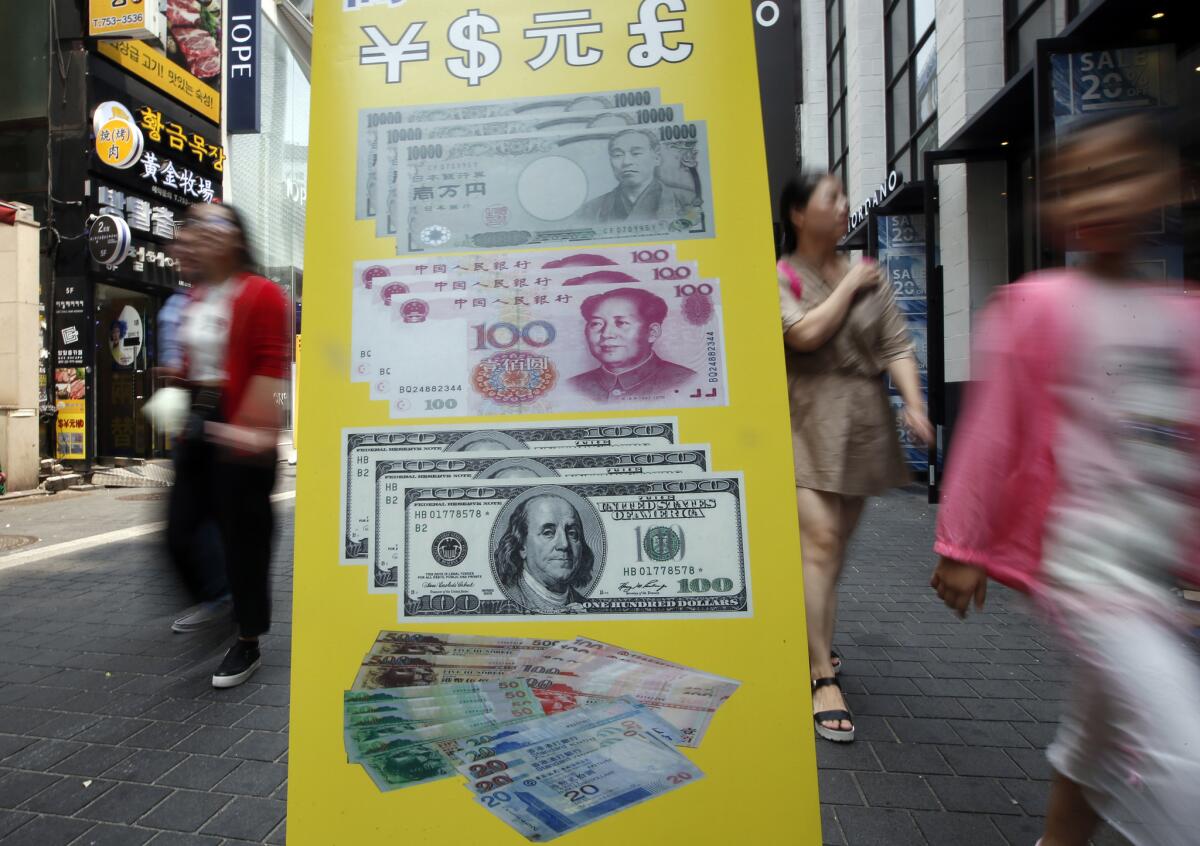South Korean official faces wrath after saying 99% of his countrymen are ‘like dogs and pigs’
- Share via
Reporting from Seoul — They are comments so harsh they might make Donald Trump blush.
A South Korean government official is in the doghouse (and pigpen) over some disparaging remarks he made last week during a meeting with newspaper reporters, at which he said that 99% of his country’s people are “like dogs and pigs.”
Na Hyang-wook, head of the Education Ministry’s policy bureau, put his foot in his mouth while he was out for drinks, saying, among other things, that 99% of South Koreans have no ability to move up in the world and can be treated like animals — simply fed and kept alive. The remarks were initially reported over the weekend by the Kyunghyang Shinmun, a left-of-center daily newspaper.
The 99% quip recalls GOP nominee Mitt Romney’s comparatively mild remarks in the 2012 presidential campaign that 47% of Americans are dependent on government – comments that may have cost him the election. And Na’s statement was just part of a slew of eyebrow-raising remarks.
Na didn’t stop at bashing his own countrymen; he also said that African Americans and Latinos in the U.S. “don’t even try climbing the social ladder,” the Kyunghyang Shinmun reported.

The comments, and the spirited reaction to them, underscore a growing sensitivity over class distinctions in South Korea. The remarks seemed to sting particularly because Na, 47, is responsible for overseeing policy at the education ministry — and education is the thing that many South Koreans look to in order to improve their social mobility.
When she heard of Na’s remarks, 27-year-old office worker Kim Bo-ra was shocked, but the more she thought about it, not wholly surprised.
She said she already didn’t have a very high opinion of her country’s political elite. “I don’t feel that mad because I’ve come not to expect much from leaders and people in politics,” said Kim. “But at the same time, his remarks were really strong.”
Na reportedly made the comments during an evening gathering with some Kyunghyang reporters. He has not commented publicly since the remarks were reported, but hasn’t denied making them.
After being reported, Na’s remarks quickly became a trending topic on social media, with many voicing outrage and calling for Na to be fired. The ministry’s Facebook page has been inundated with angry, sarcastic comments, many of them starting with mock formal greetings that translate as, “How do you do? I’m a pig/dog.”
On Monday, Na’s case was still all over Korean-language Twitter, with users sharing links that used the case as fodder for jokes, with one headline (link in Korean) asking, “Maybe [if he gets fired] Na can go back to his hometown and raise pigs and dogs?” (Na is originally from Masan, a small city in the country’s south.)
A lot of people suspect that this is how their government feels about them, but we almost never hear it. These comments confirm those suspicions.
— Sewoong Koo, managing editor of Korea Expose
It is not clear what Na will do next, and whether he’ll be able to continue in his position at the ministry. An Education Ministry official told the Korea Times that Na regrets the comments and was under the influence of alcohol at the time. The official also said that Na is currently suspended from his position, and a final decision on his fate will be made after further investigation.
The timing of the remarks could hardly have been worse. South Koreans are increasingly up in arms over growing inequality and rising unemployment, particularly among youth. Online, young people here regularly describe the country as “hell” and decry their inability to get ahead.
Survey data released earlier this year by Statistics Korea, a government body, found that the percentage of respondents who felt that it was possible to move up the social ladder through their own effort fell from 37% in 2009 to 22% in 2015. A survey by the Organization for Economic Cooperation and Development this year found South Korea ranking second from the bottom among 35 member countries in terms of wage inequality.
See the most-read stories in World News this hour >>
Some analysts suspect that South Korean government officials view their constituents with condescension, and that Na was merely saying what many believe. “It’s the fact that someone actually came out and said this that’s extraordinary, and what makes it so resonant,” said Sewoong Koo, managing editor of Korea Expose, a reporting and analysis website.
“A lot of people suspect that this is how their government feels about them, but we almost never hear it. These comments confirm those suspicions,” Koo said.
Park Ji-youn, 22, a recent college graduate, said she hopes the kerfuffle caused by Na’s commentary may actually be instructive to other people in high places.
“Hopefully the attention this has aroused will teach government officials like him that the way they think is not quite normal,” she said.
Borowiec is a special correspondent.
MORE WORLD NEWS
Obama leaves final NATO summit with work unfinished on both Afghanistan and Russia
Japan’s ruling coalition wins election, opening door to constitutional change
Egypt wants to revive the Israeli-Palestinian peace process
More to Read
Sign up for Essential California
The most important California stories and recommendations in your inbox every morning.
You may occasionally receive promotional content from the Los Angeles Times.













